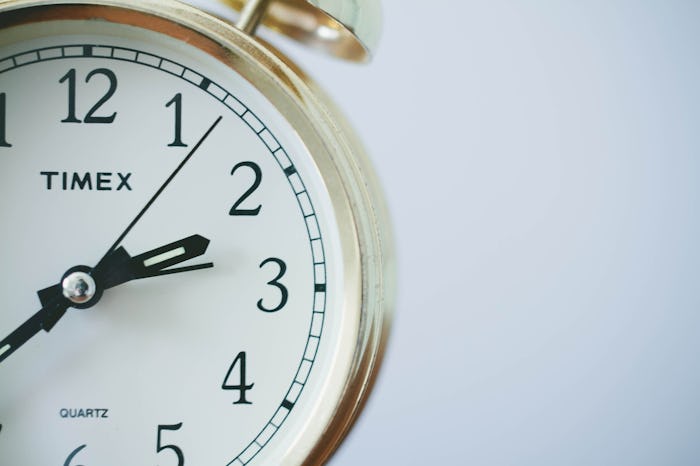Life
How Does Daylight Savings Time Affect Your Health? In More Ways Than You'd Think
When you think of daylight savings time, you probably think of that hour of sleep you're either gaining or losing. I mean, that's what I'm most concerned with. Then again, I am in a very, very loving relationship with sleep. What I don't think of, and what you probably don't think of either, is all the things daylight savings time affects because of the disruption in your sleep schedule. Sop how does Daylight Savings time affect your health? There's a huge tie to how much sleep you get and your health, so it's only natural that there would be a slew of ways that daylight savings time affects your health.
Disrupts Your Body Clock
First and foremost, daylight savings time has a tendency to disrupt your body clock. And though some people are more affected by the change in their sleep schedule than others, there are several common issues that come along with changing your clock. According to Live Science, it can feel a little harder to get out of bed on Monday morning, regardless of which season of daylight savings time you're in. Because of that fluctuating hour, many people wind up going to bed at an abnormal time on Sunday evening after the start of daylight savings time, which in turn, affects your Circadian rhythms, according to Live Science.
Mood/Productivity
This disruption in your circadian rhythm has several large effects on your health. One of the most obvious effects is your change in productivity. According to Time, on average, Americans lose 40 minutes of sleep during daylight savings time. This lack of sleep can lead to a change in your emotional center of your brain, according to CBS News. "We know from small studies that in people who are sleep deprived, the amygdala, which is the emotional center of the brain, is much more reactive to disturbing images as compared to somebody who's well rested," Dr. Charles Czeisler, chief of sleep medicine at Brigham and Women's Hospital, told CBS News. Sleep disruptions can also affect your concentration levels and memory, making your productivity shift along with daylight savings time.
Heart Trouble
The Monday and Tuesday after daylight saving time in the spring have also been associated with a 10 percent increase in heart attacks, according to a 2012 study at the University of Alabama Birmingham. According to associate professor and Ph.D. Martin Young, there are several theories behind the finding. “Sleep deprivation, the body’s circadian clock and immune responses all can come into play when considering reasons that changing the time by an hour can be detrimental to someone’s health," Young told UAB News.
Appetite Changes
Dr. Czeisler also told CBS News that though not quite as serious of an effect, that daylight savings time transitions can cause changes in your diet. "Sleep deficiency increases the release of the hormone ghrelin, which makes us hungry, and decreases the release of the hormone leptin, which makes us feel satisfied when we eat," Czeisler said. In other words, sleep deprivation affects hormone levels in your body, which can lead to changes in your appetite, increases in cravings, and the potential to eat too much.
How To Cope
Rather than winging it, and suffering all the effects that daylight savings time can have on the health, prepare for the event and combat the possible side effects before they set it. To combat the effects of the time transition, the National Sleep Foundation recommends creating a bedtime routine you can stick with, powering off electronics to sleep, and more, to create the best possible sleep environment for yourself.
